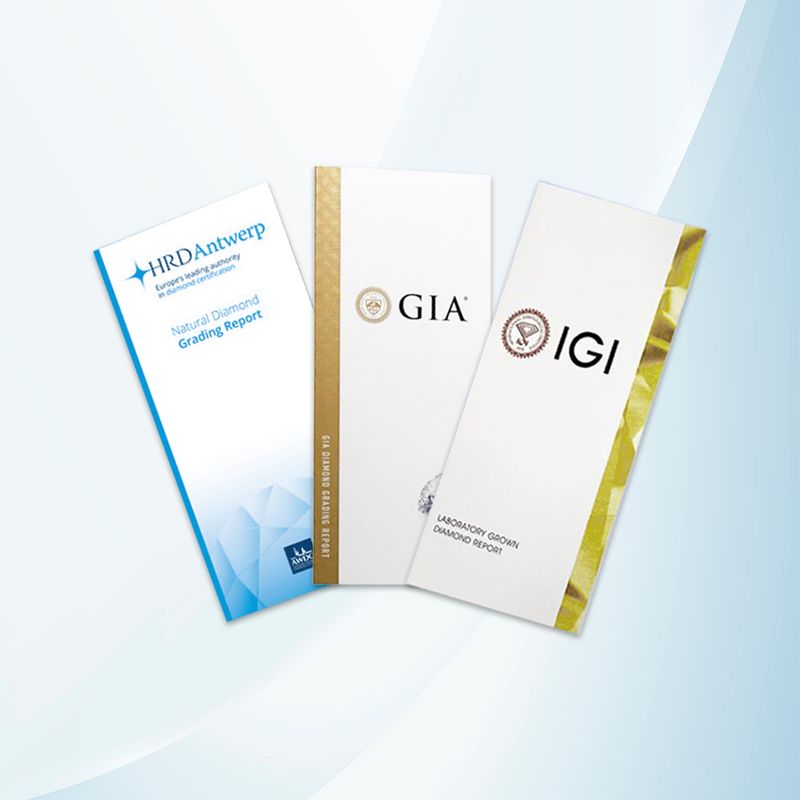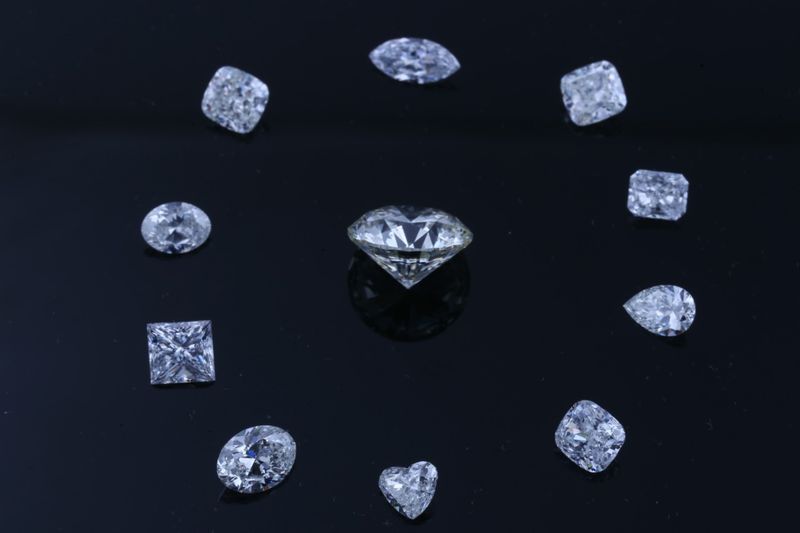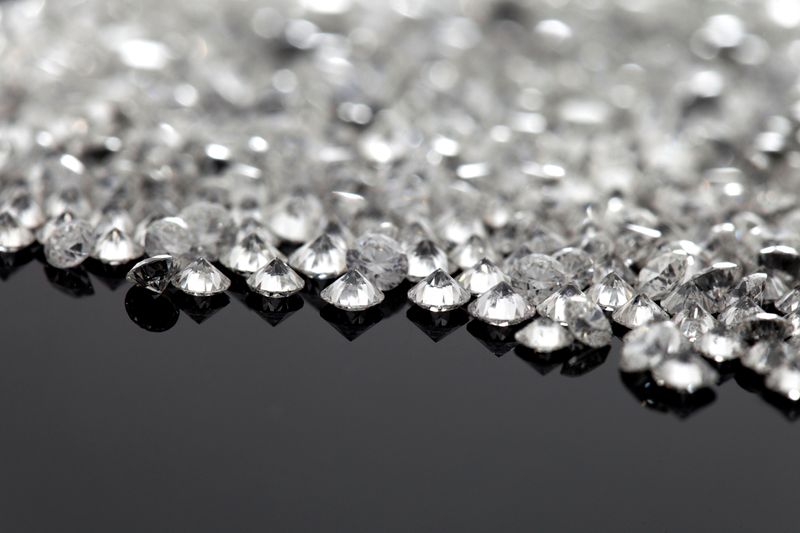DELIVERING VALUE
Your trusted diamond partner
Wadhwana International Ltd deals in ethically sourced, high-quality diamonds with a focus on transparency and trust. We ensure every transaction is smooth, secure, and tailored to our clients’ needs.

Certified Diamonds
Not all diamonds are created equal. At Wadhwana International Ltd., we offer a range of certified diamonds graded by globally recognised labs through a third-party grading process. Our certification reports provide detailed information about the diamond’s quality, ensuring that our customers can make informed decisions with confidence. With our commitment to ethical and sustainable practices, our customers can rest assured that they are investing in authentic and pure diamonds.
Fancy Diamonds
Truly Rare and Valuable- The Essence of Exclusivity
Fancy diamonds, with their unique and rare colours, are considered more precious than their clear and colourless counterparts. Due to their rarity, they require special attention and techniques during the grading and evaluation process. At Hari Krishna, our in-house experts specialise in handling and grading fancy diamonds to ensure that only the highest quality diamonds are delivered to our customers.


Loose Diamonds
At Wadhwana International Ltd., we don’t just deal in diamonds—we deal in brilliance. Our curated selection of loose diamonds brings together unmatched quality, ethical sourcing, and a promise of perfection, ready to be transformed into timeless treasures.
Basic Shapes
| Types of Diamond | Description | Image |
|---|---|---|
| Round – (RD) | This is by far the most popular of the shapes available today. Using precise mathematics and theories on the interplay of light, the process of producing a Round Diamond has been fine tuned for over a century to bring forth this shape’s magnificent fire and brilliance. |  |
| Princess – (PR) | Just like the aura that surrounds its name, a Princess Diamond is a thing of beauty. Cut in a traditional square with pointed corners, a Princess Diamond exudes elegant brilliance and is often used to adorn an engagement ring. |  |
| Emerald – (EM) | The Emerald Diamond draws inspiration from the traditional pavilion cut of emerald gemstones. In the Emerald Diamond, the pavilion is cut with rectangular facets to produce a unique optical appearance, offering a larger, open table that highlights the clarity of the diamond. |  |
| Asscher (Square Emerald) –(SQEM) | Similar to the emerald-cut is the Asscher. Only it is square in shape. While keeping to the overall emerald-cut, the pavilion is faceted to produce a unique refractive appearance. |  |
| Marquise – (MQ) | The Marquise brings to mind the sophistication and elegance of the French. Born of nobility, this shape is perfect for long slender fingers and gives the illusion of largeness in comparison to other diamonds. A Marquise Diamond often looks stunning when it is set with Round or Pear-shaped side stones. |  |
| Oval – (OV) | Oval Diamonds are highly regarded for their inner brilliance and eye-catching shape. Especially when languidly flashed from slender fingers. |  |
| Square Radiant – (SQRT) | While all Radiant Diamonds do not have precisely the same shape, the Square Radiant Diamond is distinctly square in its silhouette. One of the most preferred types in jewelry, it’s even shape and signature trimmed corners work well when set with side-highlight diamonds such as Baguettes or Round Diamonds. |  |
| Radiant – (RT) | At first glance you may be surprised. Here is a diamond shape that somehow had its corners trimmed off! But this is precisely the signature of a Radiant. A popular and versatile choice for jewelry, the radiant-cut looks equally beautiful set with either baguette or round side-diamonds. Radiant-cut diamonds can vary in their degree of being rectangular. |  |
| Pear – (PS) | As sparkling as a falling tear. As softly rounded as a Pear fruit. This is the sweet and elegant Pear Diamond shape. This shape is often chosen for its romantic appeal as well as its flaring design. An elongated Pear Diamond shape creates a subtle slimming effect on fingers. |  |
| Heart – (HRT) | The symbol of love. This is a choice for the romantic. A Heart Shape speaks of love like no other. A distinct and purpose-derived shape, the Heart Shape is often the lover’s preferred diamond gifting choice. |  |
| Cushion Brilliant(CUBR) Cushion (CU) Cushion Modified Brilliant (CUMBR) | Also known as a ‘Pillow-cut’, Cushion Shape diamonds have rounded corners and larger facets that increase their brilliance. Cushion Shape diamonds are available in a variety of shapes including square and rectangular. |  |
| Triangle (TA) Trilliant (TR) | A shape that fits all occasion and reason. This shape is often chosen for its romantic appeal as well as its flaring design. A popular and versatile choice for jewelry. TA contains 22 facets while TR contains 43 facets. |  |
| Fancy Shape (FS) | This is something special, fancy shapes are shape that are carved and made keeping an inspiration in mind. This displays the creativity of the craftsman. |
Carat
The unit of measurement used to describe the weight of diamonds is called ‘Carat’. The ‘Carat’ weight is commonly expressed in points or fractions.
| Price consideration with Size Range | Weight (unit): 1ct=100 cents 5cts = 1.000gms |
|---|---|
| 0.15 | 0.15 – 0.17 |
| 0.18 | 0.18 – 0.22 |
| 0.23 | 0.23 – 0.29 |
| 0.30 | 0.30 – 0.39 |
| 0.40 | 0.40 – 0.44 |
| 0.46 | 0.45 – 0.49 |
| 0.50 | 0.50 – 0.59 |
| 0.60 | 0.60 – 0.69 |
| 0.70 | 0.70 – 0.74 |
| 0.75 | 0.75 – 0.79 |
| 0.80 | 0.80 – 0.89 |
| 0.90 | 0.90 – 0.99 |
| 1.0 | 1.00 – 1.19 |
| 1.20 | 1.20 – 1.49 |
| 1.50 | 1.50 – 1.69 |
| 1.70 | 1.70 – 1.99 |
| 2.00 | 2.00 – 2.99 |
| 3.00 | 3.00 – 3.99 |
| 4.00 | 4.00 – 4.99 |
| 5.00 | 5.00 – 6.99 |
| 7.00 | 7.00 – 9.99 |
| 10.00 | 10.00 – 999.99 |
Color Scale
| type of colors | |||||||||||||||||||||||||||||||||||||||||||||||
|---|---|---|---|---|---|---|---|---|---|---|---|---|---|---|---|---|---|---|---|---|---|---|---|---|---|---|---|---|---|---|---|---|---|---|---|---|---|---|---|---|---|---|---|---|---|---|---|
|  | ||||||||||||||||||||||||||||||||||||||||||||||
Clarity Grade
| Code – Shade | Description | Image |
|---|---|---|
| FL Flawless | Diamonds in this range have no inclusions, neither internal nor external. |  |
| IF Internally Flawless | No internal inclusions visible with 10x magnification. There may be some tiny external irregularities in the finish. |  |
| VVS1 Very very slightly included 1 | Extremely difficult to see the inclusion. Even difficult to spot by trained eyes with 10 x. |  |
| VVS2 Very very slightly included 2 | Still difficult to see the inclusions with 10x magnification but easier than VVS1. |  |
| VS1+ Better than VS1 & closer to VVS2 | Slightly better than VS1. |  |
| VS1 Very slightly included 1 | Little difficult to see the inclusions with 10x magnification. |  |
| VS2+ Better than VS2 & closer to VS1 | Slightly better than VS2 |  |
| VS2 Very slightly included 2 | Very small inclusions visible with 10x magnification |  |
| SI1+ Better than SI1 & closer to VS2 | Slightly better than SI1. |  |
| SI1 Slightly included 1 | Small inclusion visible with 10x magnification. |  |
| SI1- lower than SI1 | Slightly lower than SI1 |  |
| SI2+ Better than SI2 & closer to SI1 | Slightly better than SI2 |  |
| SI2 Slightly included 2 | Small inclusions easily visible with 10x magnification. |  |
| SI2- lower than SI2 | Slightly lower than SI2 |  |
| SI3+ Better than SI3 & closer to SI2 | Slightly better than SI3 |  |
| SI3 Slightly included 3 | Inclusions that may be visible to the naked eye for a trained observer |  |
| SI3- Slightly lower than SI3 | Slightly lower than SI3 |  |
| I1+ Better than I1 & closer to SI3 | Slightly better than I1 |  |
| I1 Included 1 | Inclusions that may be easily visible to the naked eye for a trained observer. |  |
| I1- lower than I1 | Slightly lower than I1 |  |
| I2+ Better than I2 & closer to I1 | Slightly better than I2 |  |
| I2 Included 2 | Many flaws clearly visible to the naked eye that also decrease the brilliance |  |
| I2- lower than I2 | Slightly lower than I2 |  |
| I3+ Better than I3 & closer to I2 | Slightly better than I3 |  |
| I3 Included 3 | Many flaws clearly visible to the naked eye which decrease the brilliance and compromise the structure of the diamond, making it more easily cracked or chipped. |  |
| I3 – lower than I3 | Slightly lower than I3 |  |
